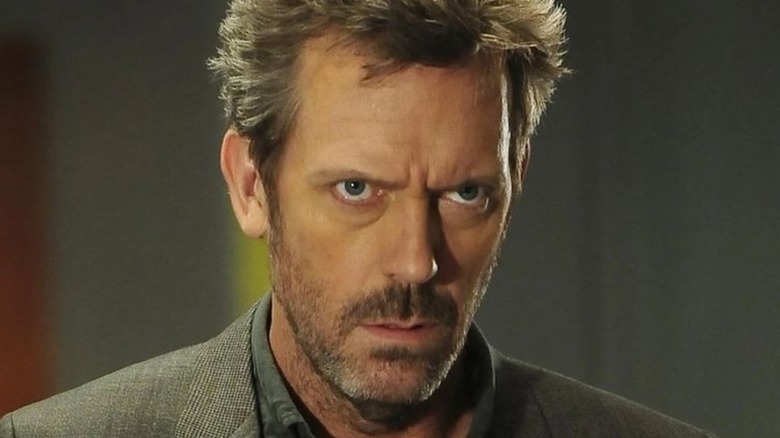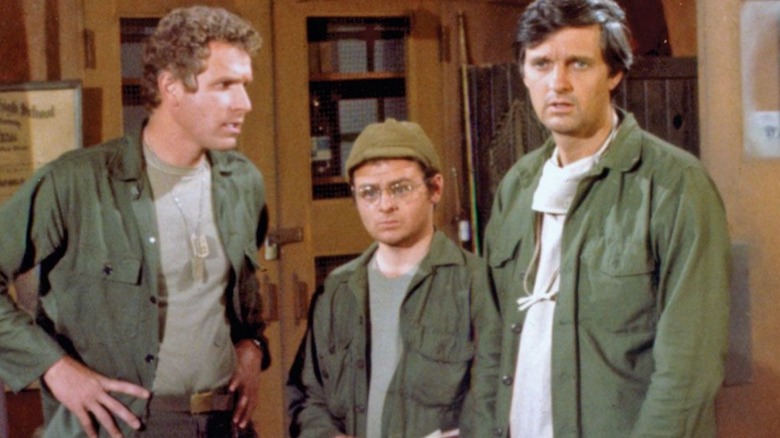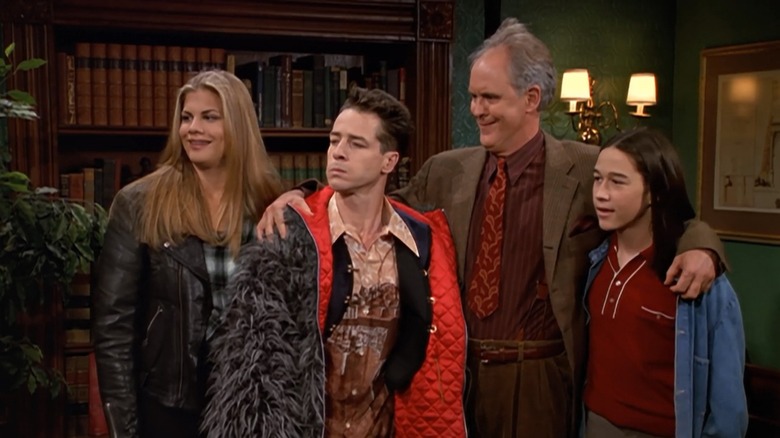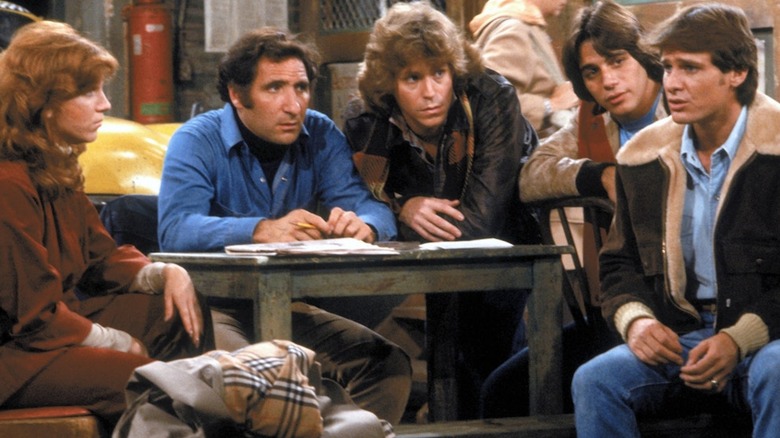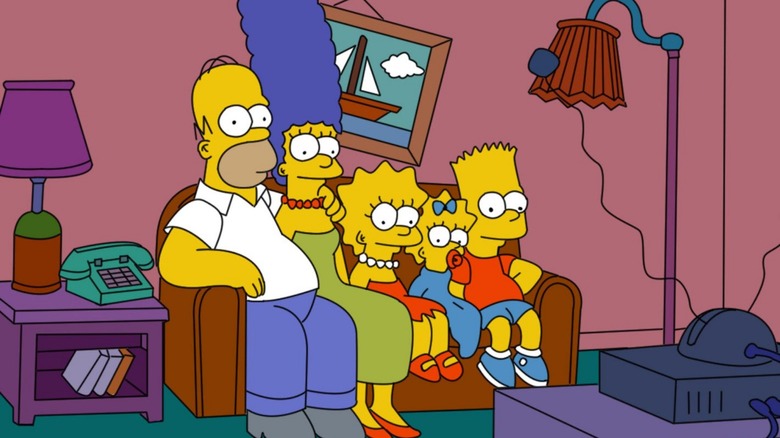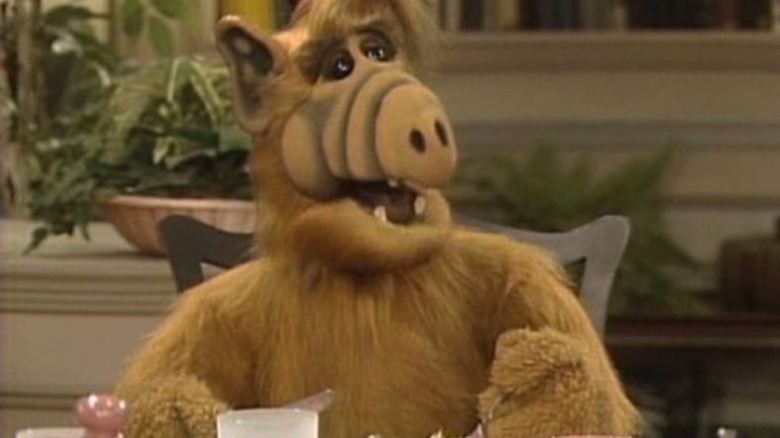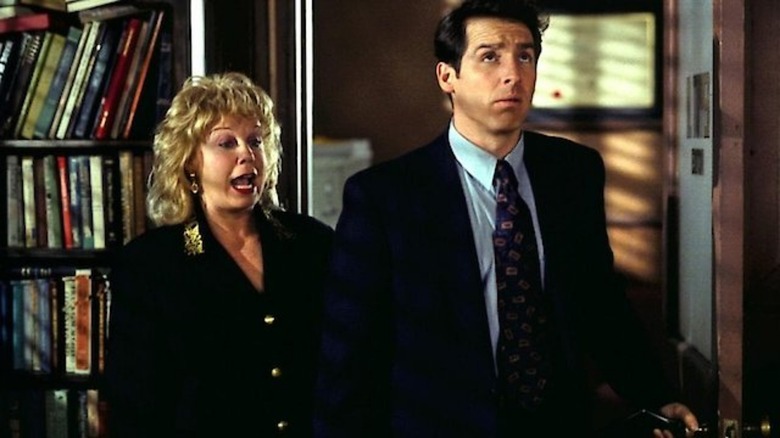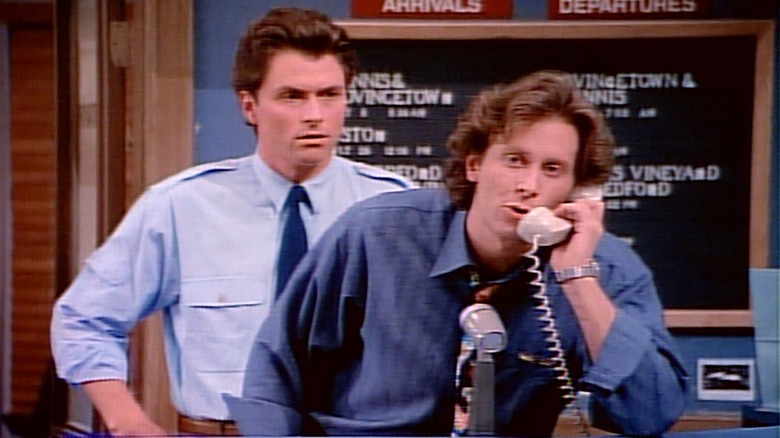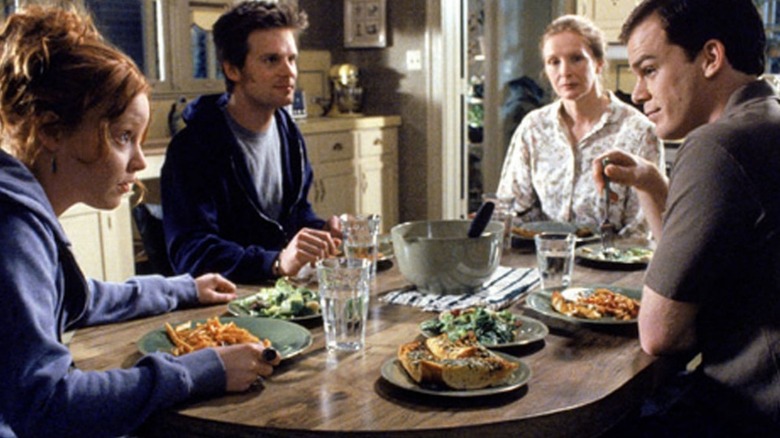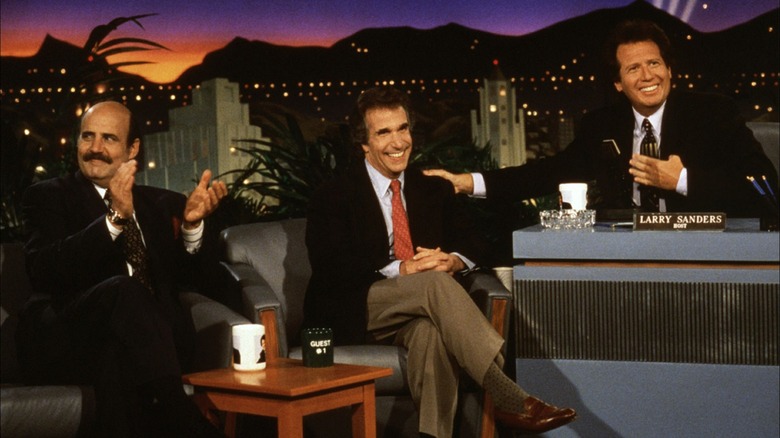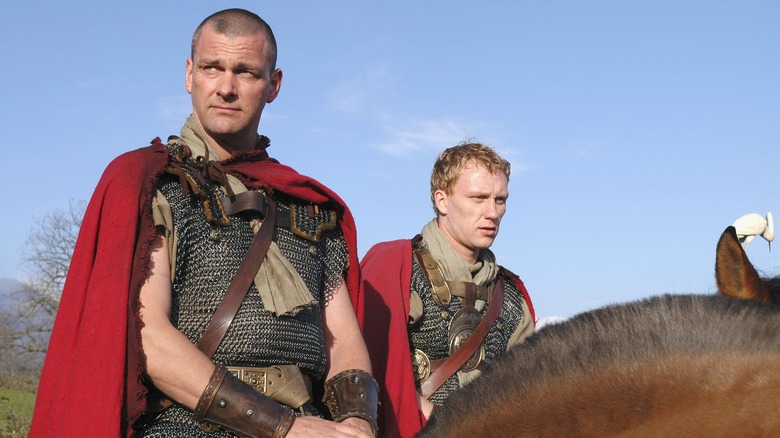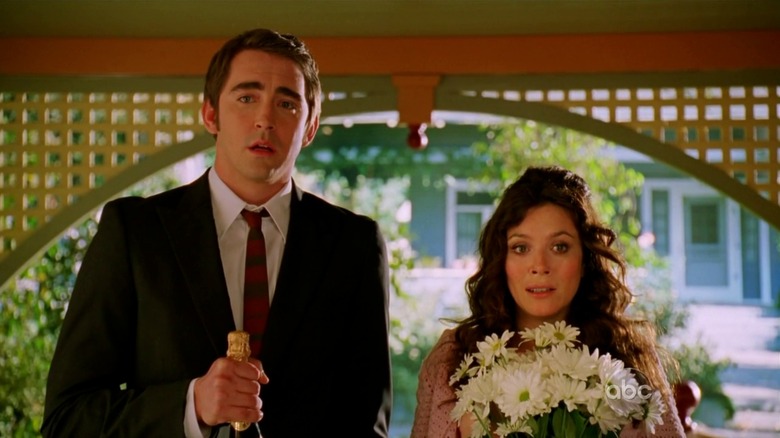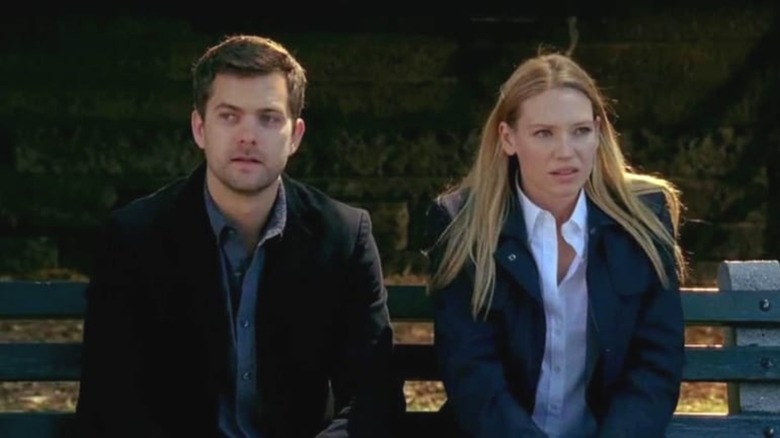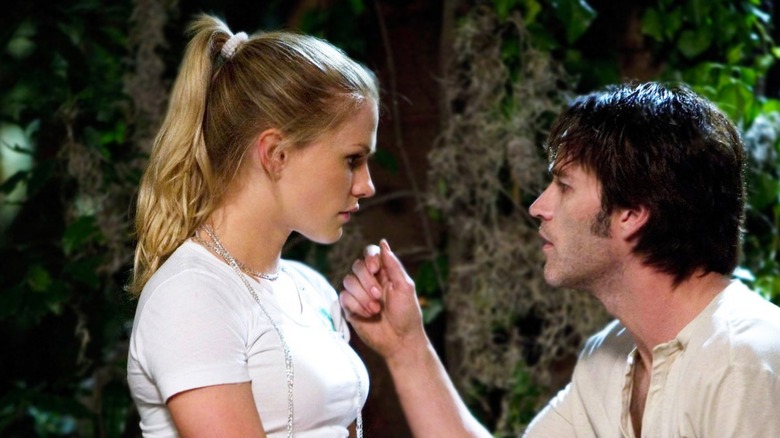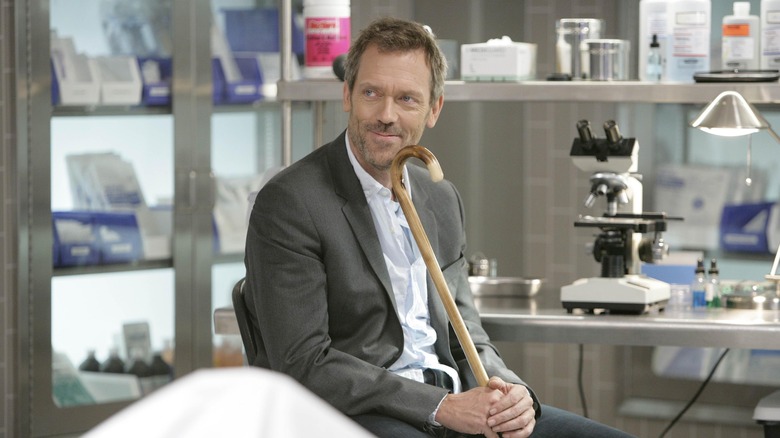Once Popular TV Shows No One Talks About Anymore
It used to be that there were too many channels on television but never anything good to watch. That's the cliche of the 20th century, but in the 21st, the opposite holds true. Now, we have countless options with streaming services, broadcast HDTV, and cable, and there's simply too much good content and never enough time to watch it all. Most people assemble a list of recommended series... that they'll just never get to.
Because of this, incredibly popular TV shows often create a stir while on the air but soon after the series finale they creep back into the bushes like an all-too-familiar Homer Simpson meme. Some shows don't contend with this problem, so you'll always see pop culture references or even revivals or reboots decades after a series ends.
This rings true of "Star Trek," "I Love Lucy," "Game of Thrones," and a plethora of other amazing series. Many others once dominated our television sets and have fallen into obscurity under the ever-increasing pile of new content. These series all once sat atop everyone's must-see list but now you rarely see any references to them or even hear someone talking about them anymore.
M*A*S*H
Two years after "M*A*S*H" hit the silver screen, CBS developed a television spinoff featuring many of the same characters. One of only three actors from the movie to star in the series was Gary Burghoff, who reprised his role as "Radar" O'Reilly. The rest of the cast consisted of Alan Alda, Loretta Swit, Jamie Farr, and many others. The series wasn't an instant hit, but "M*A*S*H" was all anyone could talk about before long.
"M*A*S*H" ran for 256 episodes, and its series finale, "Goodbye, Farewell and Amen," long ranked as the most-watched TV program of all time, with 105.97 million people tuning in. "M*A*S*H" lost this distinction in 2010 to Super Bowl XLIV. "M*A*S*H" was one of the most talked about series, having launched several prominent careers and some unsuccessful spinoffs.
While folks don't discuss it today as much as decades earlier, "M*A*S*H" remains a highly influential series. The way the series walked a fine line between humor and the horrors of war proved comedy could exist in any setting. "M*A*S*H" also pioneered dual plotlines, which utterly changed the structure of sitcoms.
3rd Rock from the Sun
It seems like a wacky premise for a show, but no one can deny that "3rd Rock from the Sun" was stellar during its run. The series revolves around four aliens posing as humans on Earth. John Lithgow plays the commander who sets his sights on establishing a relationship with Mary Albright (Jane Curtin), another professor at the university where he works.
French Stewart as Harry, Kristen Johnston as Sally, and Joseph Gordon-Levitt as Tommy join Lithgow in the cast. The characters are all clueless but good at heart, and the show never fails to garner laughs. "3rd Rock" won numerous awards, including several Primetime Emmy Awards, among them one for John Lithgow, who earned a nomination in the outstanding lead actor in a comedy series category every year "3rd Rock" was on television.
These days, you don't hear many people talking about "3rd Rock," as it's been off the air since 2001. Despite this, the series helped pave the way for everyone involved. Lithgow's popularity only increases with time, and Gordon-Levitt remains one of the most popular actors of his generation.
Taxi
"M*A*S*H" wasn't the only highly influential show to come out of the 1970s — "Taxi" proved equally popular during its five seasons. The series unfolds primarily during the night shift at the Sunshine Cab Company in Manhattan. The main characters are all cab drivers, played by Judd Hirsch, Jeff Conaway, Marilu Henner, Tony Danza, and Christopher Lloyd, with Andy Kaufman as a mechanic and Danny DeVito as the dispatcher.
"Taxi" represented DeVito's first major television work, and he won a Primetime Emmy Award for outstanding supporting actor. DeVito was hardly alone, as the series garnered dozens of Emmy Award nominations and wins over the years. Also, like "M*A*S*H," "Taxi" didn't shy away from complex and humorless subjects. The series tackled everything from addictions to racism, sexual harassment, and dissociative identity disorder.
The show's success helped everyone's respective careers, though some benefited more than others. Still, "Taxi" introduced the world to Danza, who was discovered in the boxing ring. "Taxi" also showcased the talents of Kaufman in his most prominent sitcom work. While "Taxi" generates little discussion today, "Rick and Morty" referenced its theme music in a 2022 episode.
The Simpsons
Cards on the table, "The Simpsons" is the most successful American animated sitcom of all time. More than 750 episodes have aired since the series began, and "The Simpsons" is also one of the most influential cartoons ever created. So, why did it land here among TV shows people don't talk about anymore? To put it plainly, "The Simpsons" hasn't been anywhere near its height in popularity for a very long time.
"The Simpsons" shot out of the gate, upsetting the balance of network television. A sitcom without a laugh track, the jokes were bold and hilariously in-your-face about everything, whether controversial or not. "The Simpsons" was groundbreaking television, but as time passed, the series jumped the shark. Many point to the Season 9 episode, "The Principal and the Pauper," as the culprit.
That episode came soon after a changing of the guard, with most of the early writers gone from the production. Since then, "The Simpsons" has had its ups and downs and somehow eerily predicted the weirdest things that ultimately came true. While it still airs and gets extended every couple of years, "The Simpsons" lost its popularity ages ago.
ALF
"ALF" must be one of the strangest things to come out of the '80s, and that's saying something. On the surface, "ALF" is a family sitcom focused on an ordinary suburban middle-class family with an unusual house guest. Of course, that guest is Gordon Shumway, an alien from the planet Melmac who crashed into the Tanner family's garage. The Tanners give him the nickname "ALF," for Alien Life Form, and he integrates into their lives.
A rather pedestrian plot, yes, but that's "ALF" — suburban normalcy mixed with a dash of absurdity. "ALF" took time to build an audience, but once it established itself as primo primetime programming, "ALF" was everywhere, with the character on shirts, lunch boxes, and a tie-in comic series published by Marvel Comics.
Eventually, "ALF" disappeared from TV, having aired 102 episodes in four seasons, including a TV movie to finish out a cliffhanger. Most viewers moved on, and "ALF's" popularity diminished. It was pretty well laid to rest but talk of a reboot rekindled interest in the long-forgotten sitcom. Ryan Reynolds' Maximum Effort Channel started developing new "ALF" content in 2023, so "ALF" popularity may be on the rise once more.
Dream On
HBO started as a channel where folks could watch movies, but it soon developed its own programming. The 1990s brought numerous original shows, including "Dream On," which aired for six seasons, from 1990 to 1996. The series stars Brian Benben as Martin Tupper, a book editor raised on 1950s TV. Relevant clips from classic television series often interrupt his thoughts.
The series earned noteworthiness thanks to several aspects of its production, including being an early American sitcom without censorship. That's not to say it was an all-out mix of lasciviousness and profanity, but it did mean some light nudity and a complete absence of bleeps over so-called "bad words." This occurred well before HBO produced the likes of "Game of Thrones" but not too long after HBO created "Fraggle Rock," leaving "Dream On" in the middle ground.
Regardless, "Dream On" enjoyed a good run, though it seems all but invisible today. One person who benefited greatly from "Dream On's" success? Wendie Malick. Before playing Martin's ex-wife Judith, Malick had yet to land a significant recurring role in television, a medium she later dominated via "Just Shoot Me!" and "Hot in Cleveland."
Wings
For most of the 1990s, you'd be hard-pressed to find an avid TV viewer who didn't watch "Wings." The series takes place at Tom Nevers Field Airport in Nantucket, Massachusetts. Joe and Brian Hackett (Tim Daly and Steven Weber) operate a single-plane airline, working alongside others in the airport. These include Helen (Crystal Bernard), Lowell (Thomas Haden Church), and Antonio (Tony Shalhoub), etc.
That's an impressive roster, and "Wings" was a steady, if not dominating ratings performer throughout its time on the air. While not a spin-off, "Wings" shares a common universe with "Cheers" and its spin-off "Frasier," so NBC rotated several actors from that show onto various "Wings" episodes. "Wings" was also created by the same folks as those series, so there's a lot of commonality between them all in what has been dubbed the Frasierverse.
Unfortunately, "Wings" didn't permeate pop culture as effectively as "Cheers" and "Frasier." It is probably best remembered as the show that introduced Shalhoub to the world. While not his first project, it stands as his most important early work. Soon after "Wings," Shalhoub led "Monk" (2002 to 2009), another once-popular show not talked about very much these days.
Six Feet Under
HBO got into darker content when it produced Alan Ball's "Six Feet Under" in 2001. The series revolves around a family funeral home in Los Angeles. After the family patriarch dies and bequeaths the home to his two sons, they come together to run the business. Much of "Six Feet Under" focuses on the family members and their interconnected lives, with side characters working closely with the family.
The first season features morbid commercials related to mortuary products, which do a great job of framing the series' tone early on. "Six Feet Under" continued for 63 episodes, concluding with Season 5 in 2005. The series won numerous awards, including nine Emmys, three Golden Globes, a Peabody, and three Screen Actors Guild Awards.
"Six Feet Under's most significant achievement is probably its finale, "Everyone's Waiting." The finale addresses every loose plot thread and sees every main character's death, but it isn't sad — it's uplifting and wonderful. George R.R. Martin called it "far and away the best finale in the entire history of television." Despite all of that, the series isn't often spoken about, as it's been buried by Michael C. Hall's more widely followed series, "Dexter."
The Larry Sanders Show
Garry Shandling was an incredibly talented comic, and he used his experiences working on "The Tonight Show" to develop "The Larry Sanders Show" for HBO. The series ran through most of the 1990s and centers around the titular late-night host (Shandling), his producer Arthur (Rip Torn), and sidekick Hank (Jeffrey Tambor). "The Larry Sanders Show" resembles a scathing behind-the-scenes look at "The Tonight Show" and was a spectacular success for HBO, earning numerous awards and nominations during its six seasons.
Because the series dealt with comics, many influential ones from the 1990s and before appeared as guests. The long list includes Tim Allen, Jason Alexander, Danny DeVito, David Letterman, Robin Williams, James Belushi, and dozens more. Appearing on "The Larry Sanders Show" offered a unique opportunity to parody themselves and their media images openly and to rapt applause. That applied as well to non-comedians who guest starred on the show, including Brooke Shields and David Duchovny.
"The Larry Sanders Show" may not be discussed much today, but it was highly influential for TV in the 21st century. The series influenced a ton of similar content, including "30 Rock," "Parks and Recreation," "The Office," "Arrested Development," "Entourage," and "Curb Your Enthusiasm," among many others.
Rome
Historical dramas rise and fall in popularity, and they were on the rise in the early aughts. HBO tried its hand at "Rome" in 2005, a series focused on notable historical figures from the first century B.C.E. "Rome" explored the lives of Julius Caesar, Octavian, and many others. The primary leads are two soldiers, Lucius Vorenus (Kevin McKidd) and Titus Pullo (Ray Stevenson). Their lives become inexorably tied to history's movers and shakers.
A big and ambitious program, "Rome" cost HBO and the BBC $110 million for the first season's 12 episodes. The price tag imperiled "Rome's" survival, and the series only managed to score two seasons. The final season truncates history, as it ties up all the remaining plotlines (and many years of actual history) into a single season.
Despite this, the two seasons of "Rome" make for spectacular television. "Rome" was well received but a victim of its ambition — and it ended prematurely. People may not talk about "Rome" much these days, but its impact on television is clear. Series like "Game of Thrones" arguably wouldn't have been produced had "Rome" not paved the way.
Pushing Daisies
If you're a fan of writer and producer Bryan Fuller's work, you know his shows are groundbreaking and over too soon. It's unfortunate, as his voice is as unusual and introspective as Wes Anderson, though he works almost entirely in television. One Fuller series that came and left the airwaves before its time is "Pushing Daisies," which introduced us to a piemaker, Ned (Lee Pace), who can bring anything back to life with a touch — but there's a catch.
If he ever touches them again, they instantly die. Also, if he doesn't touch them within one minute, something of equal value dies in their place. Of course, there's a love interest, Chuck (Anna Friel), but touching her would kill her, so their relationship is strictly hands-off! The series was lauded for its creativity and received numerous awards and nominations.
While it was on, "Pushing Daisies" had a cult-like fanbase, but ABC canceled it, partly due to the 2007-2008 Hollywood writers' strike. While the truly dedicated fans still love the series, few people talk about it these days, ensuring it shares a fate similar to many of Fuller's most creative endeavors by enjoying intense popularity before fading into obscurity soon after their cancellation.
Fringe
"Fringe" delivers the kind of TV tropes that began with "The Twilight Zone" and continued through to shows like "The X-Files." More to the point, "Fringe" builds on those popular series by creating something completely different while simultaneously maintaining an overarching narrative. The series focuses on FBI Agent Olivia Dunham (Anna Torv), highly dysfunctional genius scientist Walter Bishop (John Noble), and his son Peter (Joshua Jackson).
Many of the cases they work on involve an overarching plot related to a parallel universe, and almost every episode is a standalone plot tale that fits within the underlying structure, which makes it similar to "The X-Files," though paranormal intrigue takes the place of extra-terrestrial activity. "Fringe" took some time to build an audience, but once it did, the series developed a hefty cult following.
"Fringe" is unusual, but that's what makes it so appealing. The show's popularity helped it find its way into other Fox programming, and a scene casually linked it to "The X-Files." "Fringe" also generated a lot of momentary mainstream buzz by dropping the enigmatic Observer character, September, in unlikely places, including numerous Fox sports broadcasts, a NASCAR race, and "American Idol." The buzz didn't last long or help much, really, yet Fox stuck with "Fringe" for five seasons. The show concluded with its 100th episode and seemingly disappeared from public mention ever since. Sounds like a case for Dunham and the Bishops!
True Blood
Vampire stories were nothing new when HBO developed "True Blood" in 2008. Bloodsuckers ruled the horror genre long ago but "True Blood" offered something different. It lets vampires "come out of the coffin" by legitimizing them following the release of Tru Blood, a synthetic blood capable of sustaining the undead. As vampires emerge from the woodwork, werewolves, faeries, and other magical creatures slip through the cracks, creating a truly unexplored world.
The series focuses primarily on Sookie Stackhouse (Anna Paquin) and her, at first, inexplicable draw of the supernatural. She hooks up with Bill Compton (Stephen Moyer), a vampire made at the end of the Civil War. She then gets involved with seemingly every sexy beast who comes her way, including a werewolf, Alcide (Joe Manganiello), and a shapeshifter, to name a few.
"True Blood" was extremely popular during its run from 2008 to 2014 and represented another massive hit for HBO, earning numerous accolades for pretty much everyone involved. Unfortunately, like most of HBO's original content, once it wraps, it tends to fade from pop culture memory despite how beloved it was in its day.
House, M.D.
One of the most popular shows of the early 2000s, "House, M.D." starred Hugh Laurie in the titular role. Medical dramas were commonplace when it premiered but "House" offered a different take on the profession. Dr. House may be an abrasive, self-loathing masochist and drug addict but he's also one of the most brilliant minds in medicine, capable of diagnosing the rarest and most mysterious diseases.
He does this in tandem with his fellows, a staff of equally gifted physicians eager to learn from House. The series serves as one long masterclass in acting put on by Laurie, who received seven Primetime Emmy nominations for his work on the show. On top of that, Laurie interacted with an incredibly talented supporting cast consisting of Robert Sean Leonard, Omar Epps, Jesse Spencer, Lisa Edelstein, Jennifer Morrison, Peter Jacobson, Olivia Wilde, Odette Annable, and many others.
"House" was to medical dramas what "Breaking Bad" was to crime dramas — at the top of its game and still highly influential. Despite this, the show went off the air in 2012, and the cast and crew went on to other projects, and "House" no longer dominates conversations about medical series.
